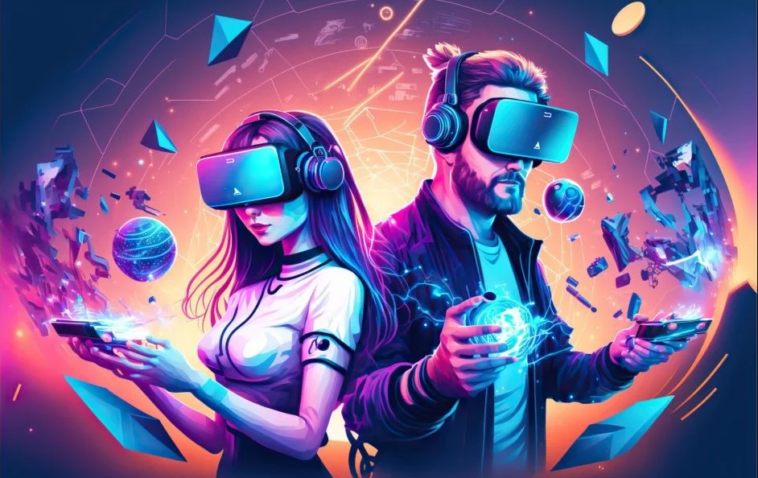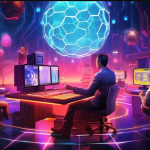Welcome to the gaming of the future, where playing games and interacting with virtual surroundings will be altered by augmented reality (AR) and virtual reality (VR). In this piece, we’ll go deeper into the world of AR and VR gaming by demonstrating how these advancements have the power to drastically change the game industry in the coming years.
Now what are we dealing with? Augmented reality (AR) and virtual reality (VR) are technologies that are paving the way for an exciting change in the gaming business. Because these immersive technologies provide gamers with revolutionary experiences they have never had before, they have the potential to revolutionize the new AR-VR gaming future. From VR’s ability to transport us to fully virtual worlds to AR’s ability to improve our surroundings, these innovations are making their mark.
The New AR/VR Gaming Future
A new era of gaming, unimaginable to come before, is about to arrive in the gaming industry with these technologies. This transformation will cause the lines between the real and digital worlds to blur. Before you get blinded by the bright future of gaming, get yourself acquainted with these technologies with us.
Digital experiences are being revolutionized by two distinct but equally intriguing technologies to bring about a new AR-VR gaming future.
Check Out These
Understanding AR and VR
If you are new to these two concepts, let us explain their functions in simple terms,
- By connecting the virtual and physical worlds, augmented reality (AR) allows digital content to interact with your surroundings.
- Virtual reality (VR) transports you to entirely virtual worlds and immerses your senses in a computer-generated environment.
The primary difference between AR and VR is that AR adds digital elements to your current world, whereas VR substitutes a virtual environment for your actual one. Now that you are aware of these technologies, let’s examine how they impact your gaming experience.
How do AR and VR influence your gaming?
The game industry is transforming as a result of the effects of both AR and VR. More and more people are pursuing a career in the industry by getting their bachelor of game design degree and stepping into the exciting field of game design. The industry is growing at an exponential rate, integrating and bringing about technologies like VR and AR.
Virtual reality (VR) provides physically engaging digital settings that improve the lifelikeness of your gaming experience. It’s quite lifelike, allowing you to walk around a virtual world, feel the breeze on your hair, and even smell the synthetic flowers. You might have already seen or experienced VR headsets and gaming setups that have been developed to give you a unique gaming experience.
A fact that is overlooked about VR is that virtual reality gaming also promotes social connection. It removes the physical constraints that come with traditional gaming, allowing you to interact more naturally and create stronger ties even when you’re not in the same room.
Meanwhile, augmented reality (AR) adds a new level of complexity to your games. It makes whatever you are playing more exciting. It enhances your play’s excitement and interest by adding variation in real-time. It is very appealing to merge the real and virtual worlds. Imagine a game where the entire room becomes a virtual playground and you can move, touch, and interact with digital objects.
This story goes deeper than just how these technologies will undoubtedly alter the way you play video games. Let’s explore more.
Check Out This: Elden Ring PS4 vs PS5
Rise of AR and VR in Gaming
The International Data Corporation estimates that income from AR and VR will reach a staggering $72.8 billion by 2024, up from $12 billion in 2020. In this sector, gaming is king, making up almost 80% of all AR and VR sales. By making significant investments in these technologies, tech giants like EA, Sony, Facebook, Google, and Amazon are driving the market to unprecedented heights.
The most recent developments and trends in the sector are contributing to the growth of AR and VR in gaming. Everyone has understood the potential it holds. High-fidelity visuals, sophisticated haptics, artificial intelligence (AI) and machine learning, eye tracking, precise motion tracking, and spatial audio are a few of these. These elements add to the games’ immersive and participatory experience, giving them a more realistic and captivating feel.
Faster and more fluid streaming of AR and VR material will be possible as 5G technology spreads. It’s conceivable that games in the future will be more customized, immersive, and interactive than they have ever been.
Role of AI, Blockchain, and IT in the Gaming Industry
Let’s now discuss blockchain, information technology (IT), and artificial intelligence (AI). These innovations are revolutionizing the gaming industry individually, and when paired with AR and VR, they create entirely new gaming opportunities. Like,
- The decentralized and transparent nature of blockchain technology holds the potential to revolutionize the creation, distribution, and gameplay of games.
- It provides real control and ownership over in-game items using non-fungible tokens (NFTs).
- You have greater control and freedom since you may purchase, sell, and trade virtual goods outside the game’s environment.
Intersection of AI, Blockchain, Information Technology, AR, and VR to Create Immersive and Engaging Gaming Experiences: Explore
There are a plethora of opportunities in the game industry due to the combination of artificial intelligence (AI), blockchain, information technology (IT), augmented reality (AR), and virtual reality (VR). Pursuing an education in this industry by taking up a bachelor of science in computer science and similar courses can also get you planted in the gaming industry.
Gamers are in for a treat because of this synergy, which creates incredibly engaging, dynamic, and lifelike experiences. With players at the center of it all, prepared to go off on incredible adventures in the gaming universe, we find ourselves at the nexus of innovation and entertainment as we investigate the junction of these cutting-edge technologies.
In the gaming business, artificial intelligence (AI) is a potent technology that lets creators make realistic, engaging, and adaptable games. It improves gameplay by offering smart opponents, allies, and NPCs that learn from players; it creates dynamic material depending on player choices and actions; and it gives feedback and recommendations for bettering game design and testing.
The foundation of the gaming business, meanwhile, is IT, which offers the platforms and infrastructure needed for game creation, play, and distribution. Through chat, audio, video, and live streaming, players may engage with one another online through cloud, cross-platform, and social gaming.
Check Out This: Far Cry 6 PS4 vs PS5 Comparison: What’s the Big Difference?
Metaverse in Gaming: How Metaverse Revolutionizes the Gaming Industry
A paradigm shift in gaming, the idea of the metaverse offers a plethora of revolutionary opportunities. Games take on new dimensions in this virtual world, where players may experience things that aren’t possible in the actual world. The metaverse offers gamers an unparalleled opportunity for exploration, socialization, and competition, and its gameplay potential is endless.
By removing obstacles between players and their games, this immersive environment has completely changed the gaming business. Because of the increased level of interaction within the gaming community, it promotes a sense of belonging. As the gaming metaverse develops and incorporates blockchain, augmented reality, virtual reality, and artificial intelligence, it has a bright future ahead of it.
It will establish a setting where players are active participants in a dynamic, constantly expanding gaming universe rather than just users. The game business is about to enter a genuinely transformational period, with possibilities as endless as the digital realms themselves.
Challenges and Strategies for Adopting AR and VR in the Gaming Industry
The incorporation of augmented reality (AR) and virtual reality (VR) in the gaming industry is not without its share of challenges, and paramount among these is the quest to enhance the customer experience.
Players demand seamless, immersive, and unforgettable journeys into the virtual realm. Striking the right balance between performance and accessibility is key. To overcome these hurdles, developers educated in every field, including the bachelor of computer engineering, are strategizing the gradual adoption of AR and VR technologies, allowing players to acclimate to these new dimensions of gaming at their own pace. The endgame is clear: an unparalleled and deeply satisfying customer experience that keeps players coming back for more.
Future Scope: The Role of AR, VR, AI, Blockchain, and Information Technology in Gaming
The future of the gaming industry is poised for a remarkable transformation, with augmented reality (AR), virtual reality (VR), artificial intelligence (AI), blockchain, and information technology (IT) at the forefront. These technologies are set to redefine the gaming landscape, offering a wealth of opportunities and experiences that will change the future of the industry.
AR and VR will transport players into immersive digital worlds, blurring the lines between reality and fiction. AI will enhance game development, creating more dynamic and responsive experiences. Blockchain will introduce transparency and ownership of in-game assets, opening up new revenue streams for both players and developers. IT will optimize network performance, ensuring seamless, lag-free gameplay.
Collectively, these technologies will usher in a new era of gaming where players can expect lifelike, interactive, and highly engaging experiences. The gaming industry will become more secure, transparent, and accessible, providing players with the opportunity to not just play games but to live and breathe them. The future of gaming is a tantalizing prospect, and AR, VR, AI, blockchain, and IT are the driving forces behind this exciting transformation.
Conclusion
The future of gaming is bright, and it promises to captivate you with immersive, realistic, and highly interactive experiences. With AR, VR, AI, blockchain, and IT at the forefront, the gaming industry is set to revolutionize how you play and engage with virtual worlds. Get ready for a gaming future like no other, where the boundaries between the real and digital worlds blur into an incredible gaming experience.
Check Out This: Is Steam Games on Ps4: Can You Play Steam Games on Ps4?




